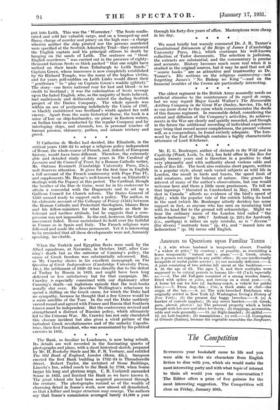When the Turkish and Egyptian fleets were sunk by the
Allied squadrons, at Navarino, in October, 1827, after Can- ning's death but as the outcome of Canning's policy, the cause of Greek freedom was substantially advanced. But, as Mr. Crawley shows in his excellent monograph on The Question of Greek Independence (Cambridge University Press, 16s.), the settlement of 1830-32 was directly due to the defeat of Turkey by Russia in 1829, and might have been long deferred or less satisfactory but for that campaign. Mr. Crawley is especially concerned with our diplomacy after Canning's death—an inglorious episode that the text-books usually slur over. He describes Wellington's reluctance to spend a shilling on the Greek cause, for which the Duke had no sympathy, because he thought that a free Greece would be a mere satellite of the Tsar. In the end the Duke suddenly veered round and agreed with France and Russia that Southern Greece must be independent. But the controversy revived and strengthened a distrust of Russian policy, which ultimately led to the Crimean War. Mr. Crawley has not only elucidated this obscure incident but also gives a vivid picture of the turbulent Greek revolutionaries and of the unlucky Capodis- tries, their first President, who was assassinated by his political enemies in 1831.
* * * *




































 Previous page
Previous page